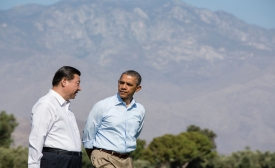philippines
The Australian government will launch Friday, March 17, the AUD90-million Education Pathways for Peace in Mindanao (PATHWAYS) program. Australian Foreign Minister Julie Bishop will lead the official launching of the project, which will primarily benefit communities in Bangsamoro areas. The project is part of Australia’s long-standing commitment to support peace and stability in Mindanao.
Filipino historians, along with arts and culture professionals, discussed the need to revisit details and connections in history to further deepen relations in countries. The symposium, which was held in Ateneo de Manila University Ricardo Leong Hall and was organized by the Japan Foundation Manila, brought together Fukuoka Prize recipients in the Philippines to lecture on the relations between the two countries going way back to prehispanic times as trade partners.

How did U.S. foreign policy efforts in the Asia-Pacific pan out under the Obama administration?
As part of the fashion exchange, the designers experienced an intensive three-phased exchange program composed of workshops, lectures and master classes in both the Netherlands and in the Philippines. They also visited embroidery centers in Lumban, Quezon and Tagaytay, handpicked fabrics in Divisoria, and attended one of Europe’s most prestigious fashion events, the Amsterdam Fashion Week.
For its 50th founding anniversary of the ASEAN and the China-ASEAN year of tourism cooperation, Philippines is tasked to execute as the current rotating chair of the ASEAN and China is reported to express its support to the country.
So far, Duterte has toured Laos, Indonesia, Brunei Darussalam, Vietnam, Thailand, Malaysia, and Cambodia. [...] the tours are potentially beneficial for Duterte, who lacks experience in national politics and international diplomacy. He intends to gather insights from various ASEAN states to strengthen engagements and build a common action agenda on regional issues. Just how this corresponds to Duterte’s broader foreign and security policies remains to be seen.
In the Foreign Service, career officers are warned about the dangers of “localitis” or the development of so close an attachment to the place of assignment that one loses one’s nationalism or patriotism. [...] what can be called “collectivitis”: an inclination that later grew into something like a passion for collecting memorabilia of the history and culture of the countries we lived in or visited to take back home.
Duterte had announced, upon being elected, that he intended to pursue an “independent foreign policy”. On September 12, he declared he was “not a fan of the Americans” and that he wanted to “reorient” foreign policy with the U.S. On September 27, he added that he wanted to pursue “new alliances with Russia and China.”







